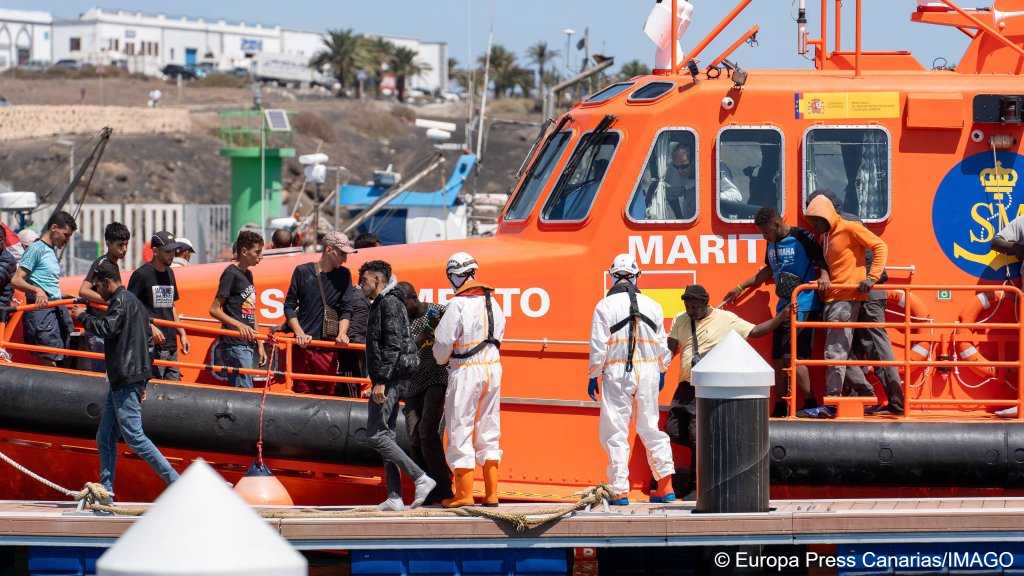A group of 49 migrant stowaways were brought into port on the Canary Island Lanzarote on August 8. On Monday, 44 out of 49 of them applied for asylum when brought before a court.
A statement from the High Court of Justice of the Canary Islands confirmed that three of the individuals claiming asylum also claim to be minors. According to reports on local news portal Canarias7 and news agencies, including Agence France Presse (AFP), those three will now be subject to age determination tests, but while waiting for their ages to be ascertained, they will be looked after by child protection services.
Five of the group did not attend the court hearing on Monday. One is still in hospital, being treated, two requested asylum at the border, and two others are minors, reports Canarias7.
The group arrived on a Dutch-flagged vessel, reported the Spanish news agency EFE. They were discovered by the crew of the Dutch tug boat, the Zwerver III, that had been pulling a barge that was traveling from the port of Dakar in Senegal to Antwerp in Belgium. It had set off from the Senegalese port of Dakar on July 29.
Read AlsoOver 1,800 died in 5 months while trying to reach Spain, says NGO
Deposit requested, emergency declared
Originally, the Spanish Maritime Authority asked the crew of the Dutch boat to post a deposit of one million euros, which was intended to cover the expenses of the 49 stowaways, including food, accommodation and travel home in the event their asylum applications are rejected.

The sum of money requested reportedly led the owner of the tugboat, HVS Dredging Support, a company that regularly makes the journey to the Canary Islands, to return to Dakar. The boat is not licensed to carry people and is purely used for cargo.
Last week, the tugboat was anchored 12 miles outside the port of Arrecife and outside Canary Islands territorial waters, before finally being allowed in on Friday (August 8) for "humanitarian reasons."
Reportedly, all the stowaways are of sub-Saharan African origin, but it has not been confirmed which nationality they might be. When they arrived, the Spanish authorities housed them in a tent at the port side, where they were held for 72 hours. A Spanish Civil Marine doctor, Rafael Munoz, told Canarias7 that he believed the "humanitarian reasons" were sanctioned after the crew of the tug boat declared an "emergency on board" and requested a port of refuge. Under international maritime law, the Spanish government cannot refuse such a request.
Read AlsoMauritania is main country of departure for migrants to Spain
Detained or released?
They were then brought before the court in order to determine whether or not they could be placed in a Foreigners Detention Center (CIE), which would have led to their expulsion from Spanish territory, but the presiding judge decided the group could be released.
Arrecife Mayor Yonathan León has been vocal about the case on social media, including on his Instagram page. He repeatedly pointed out that the crew of the tugboat should have disembarked the migrants in Morocco before heading for the Canary Islands.
León has also called for a "thorough investigation and clarification" into the reasons that led to the disembarkation of the stowaways on the island of Lanzarote. In another comment, posted on Monday, León speculates that the smugglers, who he supposes facilitated the migrants' voyage, are "using" what he refers to as the "permissive" nature of Spanish Prime Minister Pedro Sánchez's migration policy.
The mayor, who is a member of the conservative Popular Party (Partido Popular) and thus an opponent of Sánchez, underlines in his Instagram post that "The Canary Islands are about to collapse, and we don’t have the resources to welcome all these migrants from Africa, who arrive here irregularly."
León also questions why the Spanish government allowed the barge to sail on, when reportedly they discovered the presence of the stowaways just hours away from the port of Tarfaya in Morocco. León finishes his post by saying that the Spanish government should have applied international maritime law properly, which should have meant that the stowaways were disembarked in the nearest port after their discovery -- in Morocco.
Read AlsoMigrant minors center in the Canary Islands seized, ten arrested
Stowaways
It is not unusual for stowaways to attempt a crossing by hiding on board ships in various African ports. Last year, in 2024, four Nigerian citizens managed to travel to the port of Las Palmas on Gran Canaria by clinging to the rudder of a huge container ship.
In June this year, reports Canarias7, 14 Moroccan citizens, one of whom was a minor, managed to stow away on a fishing boat. When they arrived in Arrecife, they requested asylum. They remain on the island to this day, reports the regional news portal. At the time, the migrants claimed that they were crew, and they were owed at least three months’ wages, but sources close to the matter have told Canarias7 they believe they were actually stowaways.
According to the UN Refugee Agency UNHCR, in figures last updated on August 3, more than 20,000 migrants have arrived in Spain since the beginning of the year. More than 11,600 of these arrived on the Canary Islands.
The largest national group of arrivals in the country overall is made up of Malians, followed by nationals from Algeria, Senegal and Morocco, and then Guinea. On the Canary Islands route specifically, 43.9 percent of all arrivals come from Mali, 22.2 percent come from Senegal, and 10.8 percent of arrivals come from Guinea. Moroccans account for about eight percent of arrivals, and people from Mauritania about 3.8 percent.
With EFE and AFP
Read AlsoMauritania intercepts 30,000 migrants, cracks down on over 80 smuggling rings this year
